




 |
   |
 |
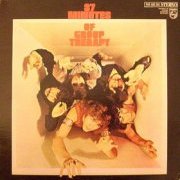 |
37 Minutes of Group Therapy (1969, 34.08) ***/TT½ |
|
| Remember What You Said Wait River Deep, Mountain High A Very Happy Day I Got to Live Can't Stop Lovin' You Baby I Must Go Cheer up Baby |
Willie I Can't Believe it |
|
Current availability:
Mellotron used:
One of several '60s bands of that name, this Group Therapy recorded two albums at the end of the decade, 1968's People Get Ready for... and the following year's 37 Minutes of... (despite actually only being thirty-four minutes long). Their schtick was Vanilla Fudge-alike heavy psych workouts, including their mentors' propensity for rocked-up covers, notably their take on Ike & Tina Turner/Phil Spector's River Deep, Mountain High, although most of the album's material is in a similar vein. To be brutally honest, it hasn't really dated that well, given that it's essentially a copy of The Fudge, who in turn couldn't really be said to sound particularly contemporary. Best track? Probably the driving hard rock/psych of Willie.
Zohar tells me that organist Jerry Guida's tape-replay work is the MkII at one (or both?) of two London studios, Chappell or Olympic, with a clicky brass part on opener Remember What You Said and a minor string part on I Must Go, leaving his coups de grâce for Wait and Can't Stop Lovin' You Baby, with full-on strings parts to rival anything else being done at the time.
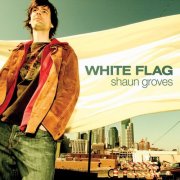 |
White Flag (2005, 45.22) *½/½ |
|
| What's Wrong With This World Sad Song Amen White Flag Crave Hummingbird Heaven Hang on Bless the Lord |
Only My Peace Has Broken Out Narrow |
|
Current availability:
Mellotron used:
I'll tell you all you need to know about Shaun Groves in three words: Modern. Rock. Christianity. White Flag (so to whom are you surrendering, you wuss? OK, don't tell me) combines upbeat stuff like opener What's Wrong With This World or Hummingbird with Coldplay-lite (!) (Amen, Bless The Lord) or gloomy acoustic stuff (Heaven Hang On, Narrow), all to little effect, all smothered in Groves' awful, whiny voice. However, the album's major failing for those of us not in thrall to an imaginary deity is its lyrical content: fuck me, why can't Christians get their heads out of their arses for long enough to write about something REAL? OK, I know perfectly well that to them, their weird fantasy world is real, but the rest of us just find it a scary place where American presidents can use phrases like 'the reality-based world' with not a hint of irony. Fucking terrifying.
Mellotron from Mellotronist To The Christian Community John (Mark) Painter, with some so-so strings on Sad Song, which means I listened to the other eleven tracks on this album for absolutely no reason, which I resent. What a horrid album. You seriously don't need its minor Mellotron use and you need its anodyne music and tedious lyrical content even less. Avoid.
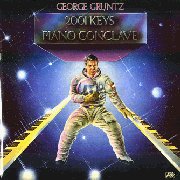 |
2001 Keys: Piano Conclave (1974, 35.28) ***½/TFlight 6-2A-A5For Dennis They're Coming, They're Coming Suite for Harold (Dedicated to Harold Rhodes) Intermission |
Current availability:
Mellotron used:
The excellently-named George Gruntz appears to have been the leader of a Swiss keyboard jazz conglomerate, Piano Conclave, no fewer than six different players appearing on their debut, 1974's 2001 Keys (just look at that sleeve...). To run through them quickly, Gruntz, Fritz Pauer, Gordon Beck, Jasper Van't Hof, Joachim Kühn and Martial Solal all play electric piano, with all but Van't Hof on acoustic, too. Gruntz and Pauer play harpsichord and synth, Beck plays organ and Van't Hof Mellotron. It's a rather 'out there' '70s fusion album, basically, heavy on the atonality and bonkers Rhodes work, several different keyboards generally playing at once in places. Prog fans may find that they prefer the lengthy Intermission to the rest of the album, although it has its dissonant moments, too.
Vant'Hof's Mellotron strings turn up on two tracks, a handful of atonal chords on For Dennis, then some of the fastest playing I've ever heard from one on They're Coming, They're Coming. Believe me, you're not going to find this easily and, unless you're a dedicated fusion fan who prefers his jazz on the weird side, you're probably best off not bothering. Given my limited knowledge of the genre, it sounds good at what it does, but there ain't a lot of Mellotron work, so don't go paying a fortune for this. Incidentally, there was one more Piano Conclave album (that I know of), the following year's more straightforwardly jazzy Palais Anthology (***½), but although Van't Hof's on it, there's no Mellotron.
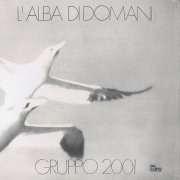 |
L'Alba di Domani (1972, 36.53) ***/TTT |
|
| Maggio Una Bambina... Una Donna Era Bello Insieme a te Paesaggio Messaggio Volo d'Angelo Padre Vincenzo Denise |
L'Alba di Domani Sa Danza |
|
 |
7" (1973) **/½ Angelo Mio L'Anima |
Current availability:
Mellotrons used:
Sardinians Gruppo 2001 released a clutch of singles throughout the '70s, but just the one album, '72's L'Alba di Domani. Like many similar Italian releases, it sounds like a poppy folk-rock group trying to be prog, in keeping with the times, material such as the folky Una Bambina... Una Donna and the overly-commercial Messaggio (a single, unsurprisingly) giving the game away. Best tracks? Opener Maggio and Volo D'Angelo, no contest, although the organ solo on the title track almost elevates it to the same level. Piero Salis plays Mellotron, with heavily reverbed flutes and strings on Maggio, drifting strings on Era Bello Insieme A Te, opening out into a full-on part, lush chordal strings on Volo D'Angelo and Denise and chordal strings and an overdubbed flute melody on Padre Vincenzo.
Speaking of singles, out of fourteen non-album tracks, precisely one has any Mellotronic involvement, the chordal flutes on, L'Anima, the flip of 1973's cheesy Angelo Mio, although the strings are real. So; do you bother with this album? It's certainly a step up from some of the rubbish that gets labelled 'Italian prog', but it's no masterpiece, with a mere handful of reasonably worthwhile tracks, possibly more worth hearing for the Mellotron.
 |
Raindance (1975, 40.53) ****/TDown the DogRaindance Mother Nature's Son 'Le Cambrioleur est Dans le Mouchoir' Ormolu Fontinental Version Wallbanger Don't Say Go (Ein Klein) Heldenleben |
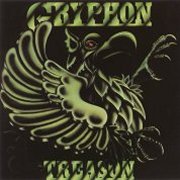 |
Treason (1977, 37.31) ****/TSpring SongRound & Round Flash in the Pantry Falero Lady Snakes and Ladders Fall of the Leaf Major Disaster |
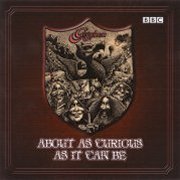 |
About as Curious as it Can Be (2002, recorded 1974-75, 54.23) ****/TRenaissance Dance MedleyMidnight Mushrumps Ethelion Wallbanger The Last Flash of Gaberdine Tailor Le Cambrioleur est Dans le Mouchoir Ein Klein Heldenleben Jigs |
Current availability:
Mellotrons used:
Gryphon were formed in the early '70s as an attempt to recreate early English musical forms, in which (in my opinion) they were rather more successful than, say, Amazing Blondel or Magna Carta. Their debut, Gryphon (1973, ****) sticks pretty closely to their original manifesto, but by their second outing, Midnight Mushrumps (1974, ****), they'd caught the prog bug and created a fascinating fusion of the two styles, medieval instrumentation mixed in with the contemporary. Red Queen to Gryphon Three (****) (you may know it for its fantastic cover art) moved further towards the prog 'mainstream'; by the time they released Raindance they were essentially a progressive band with medieval flourishes.
Raindance opens with a synth and Clavinet part that would have been completely out the question three, or even two albums earlier. Krumhorn/recorder/keyboard player Richard Harvey had moved across mainly to keys by this point, proving it with inventive arrangements and excellent playing (Royal College of Music, I believe); I suspect their US support tour with Yes may have had a lot to do with this... The songwriting is excellent, fitting perfectly into the 'very British' school of prog, common themes cropping up on different tracks; compare the title track to (Ein Klein) Heldenleben, for example. The band's medievalisms show up on the more acoustic material, like Ormolu, or their cover of the Beatles' Mother Nature's Son, complete with recorders and Brian Gulland's bassoon, but they tend to be more the exception than the rule by this point. Harvey's Mellotron only turns up on a couple of tracks, with a short string part toward the end of Fontinental Version and strings dipping in and out of the album's pièce de resistance, the sixteen-minute instrumental (Ein Klein) Heldenleben, harking back slightly towards Red Queen.
Treason turned out to be Gryphon's last album; sunk by punk, no doubt, like so many of their second division contemporaries (which is no slur on the quality of the music). It's about as near the 'mainstream' as the band ever got, which isn't that near, but the song structures are certainly more conventional (read: mostly shorter), albeit without sacrificing their customary invention in the process. There's some excellent material, including Spring Song and Major Disaster, but once again, very little Mellotron. Rather like Raindance, there's a little strings towards the end of two tracks, but it's extremely spare use for a band who owned their own machine.
In 2002, a CD of two BBC In Concert tapes from 1974 and '75 suddenly turned up, titled About as Curious as it Can Be, from the gryphon in Alice (and no, I didn't know that offhand; that's what sleevenotes are for...). Apart from the rather dodgy mixes (only stereo masters have survived), these sound great, with two otherwise unavailable tracks in Renaissance Dance Medley and Jigs (both pretty much as you'd expect). The rest of the material is from Midnight Mushrumps and Raindance and is all performed excellently; 'with gusto', in fact. Richard Harvey's keyboard rig had obviously expanded exponentially by 1975 and you can hear the Mellotron parts on Ein Klein Heldenleben reproduced faithfully on stage, but that's it on the Mellotron front for this one. To prove the tapes' authenticity (as if you'd need to), you can hear what sounds like a mic falling over on the track at around the four-minute mark. So; well worth the purchase for Gryphon fans, but minimal Mellotron.
As a postscript (bear with me on this one), I bought my own M400 in the mid-'80s for a very low price indeed, although I know of those who paid less. Twenty years later, an M400 flightcase turned up on eBay; I won it, only to find out that the seller was the same guy I bought my Mellotron from. In other words, this was my Mellotron's case. Couldn't make it up, could you? On the side, in large letters, is stencilled the word GRYPHON; in other words, my Mellotron is almost certainly their old machine. Why else would it have been housed in their machine's flightcase? Impossible to prove for 100% certain, but it seems highly likely, wouldn't you say?
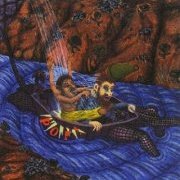 |
Great Sage, Equal of Heaven (2001, 41.12) ****½/T½Mountain of the Five ElementsBlessed Albania Zero for Conduct Five Cornered Square Ten Years of Heisei Sakura Perfect Blue El Topo |
 |
Five Suns (2004, 61.48) ****½/TTTFive SunsMictlan Topan |
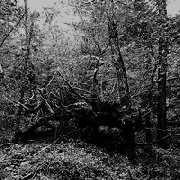 |
Black Oni (2005, 44.34) ****/T½Black Oni |
Current availability:
Mellotrons used:
Guapo was my brother Matt's band; I actually guest on Great Sage, Equal of Heaven, playing MiniMoog for all of thirty seconds on the last track, El Topo. It's a fine album; all instrumental, lots of bass, lots of drums, bits of guitar, keys and sax. They performed live as a two-piece at the time, just bass and drums, but various people helped out in the studio, as did the modern marvel of multitracking. Bassist Matt Thompson credits himself with 'bass and electronics' on the sleeve, but he actually plays practically all the keys himself, including my Mellotron on Mountain Of The Five Elements (in one take, fact fans). The track slowly builds, including a killer ascending strings part on the Mellotron, rising to a crescendo of multi-overdubbed keyboards. My personal favourite track is said album closer (nothing to do with my involvement), but the whole thing's worth hearing.
Although recorded in 2002, a sought-after deal with Cuneiform delayed the release of Five Suns until early 2004, adding two shorter tracks to the original album-long effort in the process. The band had expanded to a trio by this point, adding keys/guitar man Daniel O'Sullivan, making this something like their fifth different instrumental setup in eight years. Daniel adds hugely to the band's sound, the band 'progressifying' all round, drummer Dave Smith adding a gong to his kit, with extensive use of my vintage gear in the studio, not to mention Daniel's Fender Rhodes. Five Suns (the track) is forty-five minutes long, broken into five sections purely for the CD, more Magma-influenced mayhem, Smith's drumming (and gurning) having only become wilder since Great Sage. The piece's Main Riff is superb; a grinding, Mellotron-driven, bass-heavy zeuhl-fest to rival the masters themselves. The Mellotron (all strings) dips in and out of the piece, along with occasional bursts of Hammond, MiniMoog and Taurus pedals, although the Rhodes is the album's chief keyboard, heard to even better effect on the two later compositions, along with Mellotron strings and flutes on Mictlan. Superb.
Black Oni, again recorded some time earlier, finally appeared in spring 2005 on Faith No More Mike Patton's Ipecac imprint. Described as 'the second in a trilogy', it shows the band at their best, although it's their first release to sound anything like its predecessor; I imagine a stable lineup helps. It's extremely difficult to assess properly on one listen, but it seems to lack the central riff that made Five Suns such a joy, while otherwise not sounding dissimilar to it. Rather less Mellotron this time round, too, with strings and choirs towards the end of the piece.
What was I saying about a stable lineup? After over ten years, my brother's left his own band. C'est la vie. They've produced one album since his departure, 2008's sprawling Elixirs, Mellotron credited, but a) sampled and b) inaudible. Anyway, Great Sage and its worthy predecessor, the sadly-Mellotronless Hirohito (****) should still be available from Pandemonium while stocks last, but Five Suns and Black Oni should be easy to find, with (at last!) some sort of worldwide distribution.
p.s. Have a look at the reviews for Matt's new project, Rashomon.
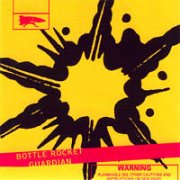 |
Bottle Rocket (1997, 50.30) **/TT |
|
| Are We Feeling Comfortable Yet? Bottle Rocket Coffee Can Revelation What Does it Take? Babble on Blue Light Special Break Me Down |
The Water is Fine My Queen Esther Hell to Pay Fear the Auctioneer Harder Than it Seems Salvation |
|
Current availability:
Mellotron used:
Myrrh? Aren't they a Christian label? Yup... Guardian were that most incongruous of genre-clashes, a Christian metal band, heavily influenced by the entirely ludicrous Stryper, with whom they toured in 1992. All the Christian music I've heard has one thing in common: the message is more important than the medium. As a result, Guardian swung with the wind, incorporating R'n'B elements in the early '90s, sounding more like a several-years-too-late grunge outfit by their last release, 1997's Bottle Rocket. Musically, it veers between the genuine heaviosity of the likes of Blue Light Special and Salvation and more insipid, 'radio-friendly' material like Revelation and What Does It Take?, none of which is especially appealing if you're not interested in the Message.
Mellotron-player-to-the Christian-community John Mark Painter is credited with Mellotron on the title track, My Queen Esther and Hell To Pay, so what exactly are we hearing on Coffee Can? Mellotron strings, that's what. Anyway, full-on strings on Queen Esther and Hell To Pay, although the strings on the title track are apparently combined with real ones. I'm tempted to think (careful with that temptation, Thompson - there's Christians about) that it's a misprunt and the credit's actually meant to be for Coffee Can. Incidentally, I don't know what produces the cello on What Does It Take?, either, but without proof, I feel disinclined to highlight it.
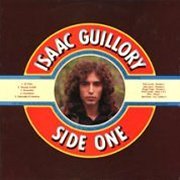 |
Isaac Guillory (1974, 31.18) ***/½ |
|
| St. Peter Staying Awhile Brusselles Steamboat Sidewalks of America The Carbondale Strutt Movin' on Ice Cream Phoenix |
El Jadida Karma Blues |
|
Current availability:
Mellotron used:
Isaac Guillory (1947-2000) is often mistaken for a Brit, as he based his career here from around 1970 onwards, though he was born at the naval base at Cuba's now-infamous Guantánamo Bay and was brought up in the States from the age of eleven. After a spell in The Cryan' Shames, he moved to Europe and began playing acoustically, becoming known as a bit of a 'guitarist's guitarist', releasing albums sporadically up until his untimely death on New Year's Eve, 2000. Isaac Guillory (sometimes erroneously known as 'Side One', after its rather poor sleeve design) was his first solo album, mixing together the various acoustic styles Guillory had assimilated up to that point. His vocals, while better than, say, his contemporary Gordon Giltrap's, are only slightly above perfunctory, but his playing is excellent, particularly on The Carbondale Strutt and El Jadida. Don't think of this as a guitarist's album, though; it's more about songwriting, with occasional flashes of fiery playing amongst the more ordinary acoustic backdrop of the bulk of the record.
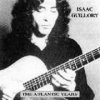 |
I can't work out if the astounding cheapness of the cover was a deliberate, 'arty' ploy, or exactly what it looks like: an artwork budget somewhere in minus figures. Each side features the same, unsmiling picture of Guillory, surrounded by a large red ring emblazoned with the side number. A narrow blue edging lists production credits, titles and musicians' credits being found to either side of Guillory's pic. Very cheap, very nasty. Side two lists Guillory's own credits, managing to misspell his name as 'Gillory' in the process. Aside from vocals, guitar and bass, he's also credited with ARP and Mellotron, although the latter can only be obviously heard as a background flute part on Staying Awhile, the flutes on Ice Cream Phoenix being real, although I wouldn't swear that the background part isn't Mellotron, too.
Anyway, a pleasant enough album, although slightly unengaging and not really a patch on Giltrap's work of the period. It sounds to me as though he would've liked to let rip a little more, but record company constraints made the album more of a singer-songwriter effort, though I could be barking completely up the wrong tree. It seems that nine of its ten tracks are available on Personal's 1997 compilation, The Atlantic Years, 1973-1974, only the brief Karma Blues missing, making it all the more odd than they chopped it off. Not bad, not great, your choice.
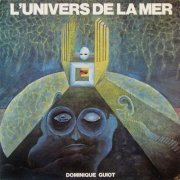 |
L'Univers de la Mer (1978, 34.11) ***½/TTT |
|
| Wind Surf Ballad La Danse des Méduses Une Ballade pour une Goélette Les Deux Poissons Ballet Amoureux des Dauphins Les Pingouins S'Amusent Destination Inconnue Iceberg en Voyage |
L'Univers de la Mer Alerte en Mer Les Émigrants de la Mer À la Découverte d'une Amphore |
|
Current availability:
Mellotron used:
It seems Dominique Guiot was (is?) a library music composer, which accounts for his relative obscurity. He debuted in 1978 with L'Univers de la Mer, an instrumental, keyboard-led work, next to nothing like any library LP you might have heard, easily passing muster as part of the sizeable progressive canon. Comparisons have been made with Mike Oldfield, but Germany's Führs & Fröhling's beautiful Ammerland is a closer match in its drumless, keys-and-occasional-guitar approach. Highlights? Possibly opener Wind Surf Ballad, the medieval-ish Une Ballade Pour Une Goélette and Alerte En Mer, but there's nothing here to offend adherents of the genre.
Guiot plays almost everything on the album, including Mellotron, with a major strings presence on La Danse Des Méduses and more of the same, to one degree or another, on Les Deux Poissons, Ballet Amoureux Des Dauphins, Les Pingouins S'Amusent, Iceberg En Voyage, Alerte En Mer, Les Émigrants De La Mer and À La Découverte D'Une Amphore, plus flutes on the last-named. The strings on Wind Surf Ballad, however, sound synthesized. At least this is finally available again, albeit on Switzerland's curiously-named We Release Whatever the Fuck We Want imprint.
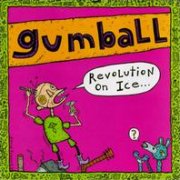 |
Revolution on Ice... (1994, 42.05) ***½/T |
|
| Revolution on the Rocks Free Grazin' With a Little Rain Nights on Fire Whatcha Gonna Do? Breath Away Gone to the Moon It Ain't Nothin' |
Read the News The Boat Race Trudge She's as Beautiful as a Foot |
|
Current availability:
Mellotron used:
Gumball were a pretty raucous bunch, going by their third (and last studio) album, Revolution on Ice... It fuses hard rock, punk and even powerpop into what was by then known as grunge, I suppose, although they predate the style by a year or two. In retrospect, they weren't really doing anything new, but they did it with such verve that it seems churlish to mark them down for unoriginality. Top tracks include Revolution On The Rocks, Free Grazin' and Breath Away, but the album's pinnacle is its closing track, their note-perfect version of the Blue Öyster Cult's She's As Beautiful As A Foot; these guys know their stuff - how often does anyone cover BÖC and not tackle (Don't Fear) The Reaper, usually badly? (See: the on/off excellent Big Country). And Albert Bouchard sings on it! Result.
Mellotron on one track, from keys man Malcolm Riviera, with strings all over Gone To The Moon, although that seems to be your lot, depending on what produces the repeating keyboard line in Trudge. To be honest, unless you're into the noisier end of things, you probably aren't going to go for this, but it does what it does well, although its highpoint isn't the Mellotron use, but the BÖC cover.
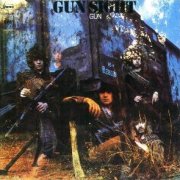 |
Gun Sight (1969, 37.34) ***½/½ |
|
| Head in the Clouds Drown Yourself in the River Angeline Dreams and Screams Situation Vacant Hobo Lady Link part one Oh Lady You |
Lady Link part two Long Hair Wildman |
|
Current availability:
Mellotron used:
(The) Gun coalesced from The Knack (obviously not that one) in 1967, featuring the Curtis/Gurvitz brothers, Paul and Adrian, their eponymous proto-hard rock debut being released the following year, gifting the world the immortal Race With The Devil (as covered by everyone). Their second (and last) album, Gun Sight (or Gunsight) appeared in '69, its contents as much a mixture of styles as you might expect for the time, running from their default setting, jammed-out psychedelic hard rock (opener Head In The Clouds, Situation Vacant), through the blues of Drown Yourself In The River and Hobo to the rather slushy, string-driven Angeline. Highlights? Head In The Clouds, the driving Dreams And Screams and the jammed-out Situation Vacant, although little here offends.
The album's only Mellotron use (player unknown) is a few-second burst as the outro to Dreams And Screams, with skronky MkII string chords splattered over random left-hand manual rhythms. While not a top album of its time, Gun Sight is good enough to make me want to hear their debut, although its Mellotron input is seriously minimal. After the split, the Gurvitzes went on to The Baker-Gurvitz Army, with everyone's favourite misanthrope on the kit and, more relevantly to this site, Three Man Army.
See: Three Man Army
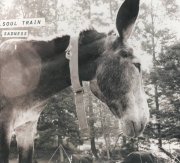 |
Donkey (2009, 38.45) ***/T |
|
| Soul Train Sudden Sadness The Fast Lane Let Go Hard Drugs and Long Relationships Don't Sell Your Soul Headlights |
South America Gold Rush Sunshine I Won't Always Be Happy, But I'll Be Free |
|
Current availability:
Mellotron used:
The Dead Tongues' Ryan Gustafson's solo debut, Donkey, is an indie-end-of-Americana album, probably at its best on its more raucous tracks, not least opener Soul Train and Don't Sell Your Soul, while his lyrics are, at the very least, thoughtful throughout.
James Wallace plays a decidedly real-sounding Mellotron flute line on Headlights, plus probable background chordal flutes on Gold Rush. Is this the most exciting album you'll hear all year? No, but I've heard so, so much worse and at least the Mellotron sounds real.
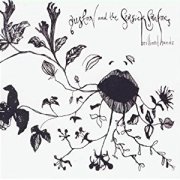 |
Brilliant Hands (2008, 32.38) ***/½ |
|
| Shake Brilliant Hands Don't Stop (to Let it Die) Homesick Fingers Crossed Lie to Me Tigers and Kittens Harder Softer Slightly Different |
Sing it Out My Days Gone Dark |
|
Current availability:
Mellotron used:
After a couple of false starts, involving entire albums being scrapped, Gustav Haggren's third release, Brilliant Hands, finally came together, a set of low-key material in an indie/folk vein, at its best on countryish opener Shake Brilliant Hands and Harder Softer.
Kristian Rimshult plays reasonably real-sounding Mellotron flutes on Tigers And Kittens, although it couldn't be said that they liven up the rather ordinary song to any significant degree. This just scraped three stars, chiefly due to Haggren's uncynical delivery, compared to many of his (chiefly) American contemporaries.
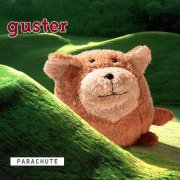 |
Parachute (1995, 43.36) **½/T |
|
| Fall in Two Mona Lisa Love for Me Window Eden Scars & Stitches The Prize Dissolve |
Cocoon Happy Frappy Parachute |
|
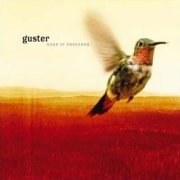 |
Keep it Together (2003, 48.16) **½/T |
|
| Diane Careful Amsterdam Backyard Homecoming King Ramona Jesus on the Radio Keep it Together |
Come Downstairs & Say Hello Red Oyster Cult Long Way Down I Hope Tomorrow is Like Today Two at a Time |
|
Current availability:
Chamberlin/Mellotron used:
In many ways, Guster typify US wet'n'windy indie (ha!), with their 'two acoustics and harmonies' approach. Of course, that can work brilliantly, but in Guster's case it all falls a bit flat, largely due to their insipid approach to the style and shoddy rhythm work, although it's better than many UK indie bands, to be fair. Their debut, 1995's Parachute, fails to hold my interest, I'm afraid; it's not all bad, but whiny vocals and limp musicianship do not a great album make. A certain Mike D. (Diamond) plays Chamberlin, with solo cellos on Dissolve, flutes (and mandolin?) on Cocoon and more cellos on Parachute, but nothing outstanding, to be honest.
Eight years and three albums later, 2003's Keep it Together has more of a band feel, but isn't honestly any better than Parachute. The title of Red Oyster Cult made me smile, but has no obvious references to the band in question, either musically or lyrically. Ron Aniello plays Mellotron this time round, with near-inaudible flutes but perfectly audible strings on the title track and string and flute parts on the bonus track, Two At A Time, complete with 'tape choke' at the end. Nice, but inessential. The albums themselves are pretty inessential, too, unless bland US indie happens to be your thang. Not much tape-replay work, either, so nothing to get excited about here. Move along, move along...
See: Samples etc.
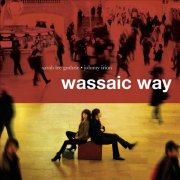 |
Wassaic Way (2013, 41.04) ***/TT |
|
| Chairman Meow Circle of Souls Sleep on it Not Feeling it Wassaic Way Wherever She is it's Spring Probably Gone 9 Outta 10 Times |
Still Dreaming Hurricane Window Lowest Ebb |
|
Current availability:
Mellotron used:
Arlo Guthrie's youngest daughter, Sarah Lee and her husband, Johnny Irion (himself a great-nephew of John Steinbeck) formed their musical partnership in the early 2000s, 2013's Wassaic Way being their fourth duo release. Much of it falls into the 'rather lightweight singer-songwriter pop' category, unfortunately, although Guthrie's country influence comes through more strongly on a handful of tracks, while the ripping, Neil Young-esque guitar solo in Probably Gone represents the album at its rockiest.
Wilco's Patrick Sansone co-produced and played several instruments, not least (Wilco's?) Mellotron, with flutes on Sleep On It and closer Lowest Ebb, background strings on Not Feeling It and the title track and flute, cello and strings on Still Dreaming. It may turn up elsewhere, but the strings on a couple of other tracks sound real.
 |
Soy (2001, 37.09) **½/T |
|
| Diablo De Verdad Quiero Vivir Volveré a Amar Caramelo Todo Vagabundo Corazón Soy Tu Lluvia |
Abrázame Labios de Fuego |
|
Current availability:
Mellotron used:
I don't really feel qualified to review anything by Alejandra Guzmán; she plays a kind of Latin pop/rock that sits way outside my normal listening parameters, not even bearing that much reference to the mainstream stuff the US spews up on a daily basis. She's apparently known as 'The Queen of Rock' in Latin America and, indeed, her ninth album, Soy, recorded in Miami, has a level of rock input, not least Tyler and Perry from Aerosmith on Vagabundo Corazón and a ripping Joe Satriani solo on closer Labios De Fuego, which isn't to say that the album rocks per se; it's still a pop record at heart.
Anyway, audible Mellotron from Randy Cantor on just one track, with some fairly obvious strings on Caramelo; perfectly nice, but do they really enhance the track, or the album? Well, they don't make it sound any worse, but when did a Mellotron ever do that? So; perfectly competent if uninspiring Latin pop/rock, one Mellotron track. Next...
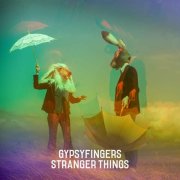 |
Stranger Things (2018, 43.35) ***/T |
|
| Half World Hey Maria The Bay Bruised Sophie's Dream Stranger Things Quit the Game Blue Sky |
The Waves Still in it Cobwebs |
|
Current availability:
Mellotron used:
GypsyFingers are the married duo of Victoria Coghlan and Luke 'son of Mike' Oldfield, who I've seen described as 'folk-influenced ethereal pop', although I'd throw in 'incorporating elements of '70s female singer-songwriter' for good measure. 2018's Stranger Things is their second album, possibly at its best on the strings-driven Sophie's Dream, the title track, the gentle Still In It and six-minute, effectively-instrumental orchestrated closer Cobwebs.
Luke's EMI M400, endearingly named 'Pedro', turns up on two tracks, with chordal choirs on opener Half World and skronky strings on The Bay, to decent effect. This isn't going to be everyone's cup of gruel (I'm not fully sure it's mine), but they do what they do with aplomb; I can imagine there's a sizeable audience out there for them. I look forward to their next release.